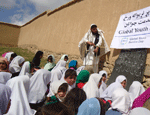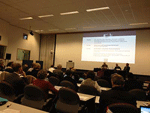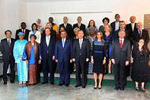Social Watch news
Published on Thu, 2013-05-30 12:55
Human rights have surged to the forefront of the debate about what will succeed the Millennium Development Goals in 2015. As human rights and social justice organizations worldwide, we feel compelled to lay out some of the baseline implications of embedding human rights into the core of the sustainable development agenda this time around. At its essence, a post-2015 framework anchored in human rights moves from a model of charity to one of justice, based on the inherent dignity of people as human rights-holders, domestic governments as primary duty-bearers, and all development actors sharing common but differentiated responsibilities. |
Published on Fri, 2013-05-24 00:00
In September 2000, when the Millennium Summit was held at the UN General Assembly, Afghanistan was suffering from conflict and could not participate in the formulation of Millennium Development Goals (MDGs). The Government endorsed the Millennium Declaration as well as the MDGs only in March 2004. However, having lost over two decades to war, it has had to modify the global timetable and benchmarks to fit local realities. The rest of the international community defined the MDGs to be attained by 2015, against a baseline of 1990. Because of its lost decades and the lack of available information, Afghanistan has defined its MDG contribution as targets for 2020 from baselines of 2002 to 2005. Despite extreme poverty, ill health, and hunger, Afghans define the lack of security as their greatest problem. Hence the Government of Afghanistan has added this new goal to the eight global MDGs recognizing the critical role of peace and security in achieving the other MDGs. |
Published on Thu, 2013-05-23 15:09
For the past one week, the poorest members of the World Trade Organisation (WTO) have been locked in a battle against the united might of the richest countries to exercise their right to be exempt from the WTO intellectual property rules. Last November, the least developed countries (LDCs) invoked Article 66.1 of the Agreement on Trade-Related Aspects of Intellectual Property Rights (TRIPS) to request an unconditional extension of the transition period for as long as they remain as LDCs. The rationale is to allow LDCs to have policy space while they overcome their constraints and develop a viable technology base. The battle is over the terms of the exemption. |
Published on Wed, 2013-05-15 13:11
Funders play a critical role in the increasingly urgent project of strengthening the capacity of global and local citizen movements to actively engage in the design and implementation of international instruments and standards. In particular, the coming three to five years will be a pivotal time for citizen movements for human rights and human dignity throughout the world. An opinion column by Tanya Dawkins, co-chair of the Coordinating Committee of Social Watch. |
Published on Wed, 2013-05-15 00:00
Robert McNamara was Defense Secretary of the US when President Lyndon B. Johnson started the "War on Poverty". Inspired by this experience, as president of the World Bank, McNamara began in 1973, a global fight against absolute poverty, which he promised to eradicate "by the end of this century." Years later, Republican President Ronald Reagan mocked his Democratic predecessor saying that "LBJ declared war on poverty ... and lost ". The same can be said of McNamara. Forty years after this global war started, the World Bank now marks 2030 as the date for completion. To avoid the embarrassment of another defeat, on top of decades of delay, the Bank seems to be lowering the bar that measures progress. McNamara drew the line of absolute poverty at 30 cents, or its equivalent in purchasing power of each national currency. |
Published on Tue, 2013-05-14 17:18
The main problem with the MDGs, globally, is that the overall approach towards development they represent is quite narrow, limiting countries’ incentives to institute structural changes that would foster development. This is particularly evident in the case of Goal 2: ‘Achieve Universal Primary Education,’ which excludes economically active people in developing countries who are in need of further education, re-skilling or vocational training. Using the case of Cyprus, we can examine how the Lifelong Learning strategy it adopted made the link between LLL and sustainable development, and ask whether the Cyprus model provides a potential model for developing countries in the post-MDG agenda. |
Published on Tue, 2013-05-14 00:00
A group of Southern NGOs, led by DAWN, ANND and Social Watch, is gathering signatures in order to send this letter in the coming days to the members of the High Level Panel that is advising the UN on the content of a future Agenda for Development post-2015. To add your signature to the letter please write to socwatch@socialwatch.org. |
Published on Mon, 2013-05-13 12:16
Here is the map of the complicated road towards a development agenda post 2015. Check out this visual from The Broker that shows which actors play a role in the Post-2015 process and provides links for further information. |
Published on Tue, 2013-05-07 12:55
In a highly publicized speech, World Bank President Jim Yong Kim announced in April that the new "highly ambitious" target of his institution will be "ending extreme poverty in the world by 2030." He said that developing countries have “a chance -- for the first time ever -- to end extreme poverty within a generation." Yet, that same goal was set 40 years ago by then World Bank president Robert McNamara and the target date was the year 2000. What's the excuse for a delay of 30 years? |
Published on Thu, 2013-05-02 10:55
Unlike many developing countries, India’s economy has been growing at a fast pace, enabling the government to mobilize the necessary resources internally for the achievement of the Millennium Development Goals (MDGs) by 2015. Its dependence on international aid, especially for financial resources is minimal; in fact it has declined bilateral aid from many countries. Despite this, however, the country has failed to achieve most of the goals and targets. The main reasons for this are inadequate funding, inappropriate administration and ignorance of policy and governance issues. Ultimately however, the failure is due to the absence of inclusiveness in the development model. Instead of enabling people to acquire basic needs such as food, sanitation, water, health care, the government is promoting ‘non-inclusive growth’ and has sought to provide basic services through subsidies with the associated problems of inefficiency and corruption. |
SUSCRIBE TO OUR NEWSLETTER












